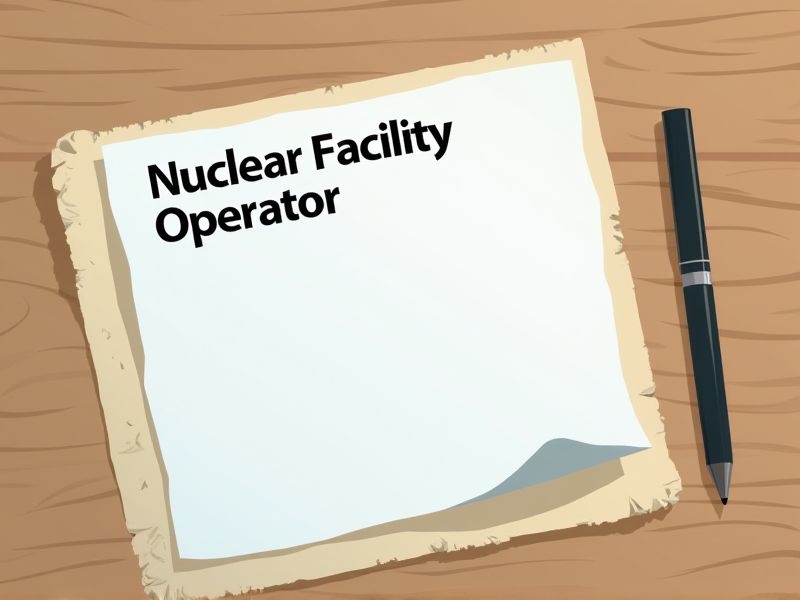
Nuclear Facility Operators are responsible for safely managing the operations of nuclear power plants, which have complex systems and high-risk environments. Certifications ensure that operators possess the necessary technical skills, safety knowledge, and regulatory compliance understanding to handle such responsibilities effectively. These qualifications help to minimize the risks associated with nuclear energy production and protect both the public and environment from potential hazards. Here are some critical certifications required for those pursuing a career as a Nuclear Facility Operator.
Nuclear Reactor Operator (NRO) License
The Nuclear Reactor Operator (NRO) License is essential for a Nuclear Facility Operator to ensure strict adherence to safety protocols and regulatory standards. Licensed operators are trained to handle critical control systems that prevent nuclear accidents, protecting both the environment and public health. Regulatory bodies like the U.S. Nuclear Regulatory Commission mandate licenses to ensure personnel competence and facility compliance. Without a license, facilities risk operational inefficiencies, potential accidents, and severe legal repercussions.
Senior Reactor Operator (SRO) License
The Senior Reactor Operator (SRO) License is necessary because it signifies an individual's capability to manage and supervise critical operations within a nuclear facility, ensuring safety and security. This license is required to meet regulatory standards established by governing bodies like the Nuclear Regulatory Commission (NRC), which aim to prevent nuclear incidents. Having an SRO License signifies that the operator possesses a comprehensive understanding of reactor systems and can make informed decisions during abnormal conditions. The intense training and examination process associated with obtaining this license ensures that only qualified personnel are responsible for reactor oversight.
Radiation Safety Officer (RSO) Certification
Radiation Safety Officer (RSO) Certification ensures that nuclear facility operators possess the necessary expertise to manage and mitigate radiation risks effectively. This certification helps maintain compliance with regulatory standards and minimizes the likelihood of radiation-related incidents by instilling proper safety protocols. Certified RSOs play a critical role in protecting both workers and the environment from potential radiation exposure. Possessing RSO Certification enhances the trustworthiness and credibility of nuclear facilities, reassuring the public and stakeholders about their commitment to safety.
Nuclear Regulatory Commission (NRC) Certification
NRC certification ensures that nuclear facility operators possess the necessary knowledge and skills to safely manage nuclear reactors, thereby preventing accidents. It establishes standardized training procedures, promoting a consistent level of safety and operational efficiency across all facilities. Certification also fosters public trust, as it demonstrates a commitment to rigorous safety protocols and quality control measures. Regulatory oversight by the NRC ensures compliance with federal safety regulations, reducing the risk of legal and financial repercussions for nuclear facilities.
Radiological Control Technician (RCT) Certification
Radiological Control Technician (RCT) certification ensures that nuclear facility operators understand radiation safety protocols, minimizing the risk of exposure. Certification provides operators with the skills needed to effectively monitor and control radioactive environments, thereby protecting both workers and the public. Without this certification, operators may lack the necessary knowledge to handle radiological emergencies, increasing the likelihood of accidents. Certified RCTs contribute to maintaining facility compliance with regulatory standards, preventing costly penalties and shutdowns.
Hazardous Materials Operations (HAZWOPER) Certification
HAZWOPER certification ensures Nuclear Facility Operators are well-versed in handling hazardous substances, mitigating potential radioactive exposure risks. Stringent federal regulations require operators to be adequately trained to maintain workplace safety and comply with environmental standards. The certification prepares operators to effectively respond to emergencies, minimizing impact during accidental releases. Proper training ultimately safeguards both facility personnel and the surrounding community from hazardous material incidents.
Emergency Management Certification
Emergency Management Certification is vital for nuclear facility operators because it equips them with the necessary skills to handle crisis situations effectively. Lack of proper training could lead to inadequate responses, increasing the risk of accidents and radioactive leaks. Certification ensures operators understand regulatory compliance, minimizing legal and safety violations. Rigorous training also instills confidence, allowing operators to execute emergency protocols efficiently under pressure.
Industrial Safety Certification
Industrial safety certification is essential for a nuclear facility operator because it ensures the operator has comprehensive knowledge of safety protocols, reducing the risk of accidents. The certification mandates continuous education on the latest safety standards, which maintains high operational safety. It reinforces a culture of safety, emphasizing accountable decision-making in high-pressure situations. Regulatory bodies often require such certifications, ensuring compliance with national and international nuclear safety regulations.
Certified Nuclear Facilities Manager
The complexity of nuclear facility operations necessitates a Certified Nuclear Facilities Manager to ensure safety and regulatory compliance. Their expertise is critical in managing risks associated with nuclear materials, thereby protecting both workers and the environment. They provide leadership in emergency response scenarios, mitigating potential hazards swiftly and effectively. By implementing industry best practices, they enhance operational efficiency and reliability, securing sustained facility productivity.
Quality Assurance Certification for Nuclear Facilities
Quality Assurance Certification for nuclear facilities ensures that operators maintain stringent safety standards, thereby minimizing the risk of nuclear accidents. Certification demands adherence to established protocols, which enhances the reliability and efficiency of the facility's operations. It provides a structured system for continuous monitoring and improvement, which is crucial in managing the complex systems involved in nuclear operations. Regulatory bodies require such certification to ensure that operators comply with national and international safety regulations, which protects public health and the environment.
Summary
By earning certifications, you enhance your credibility and operational expertise in the nuclear sector. Certified operators lead to increased safety, minimizing risks of accidents and incidents. Gaining expertise contributes to improved efficiency and compliance with regulations. Your credentials foster public trust and confidence in nuclear energy operations.
